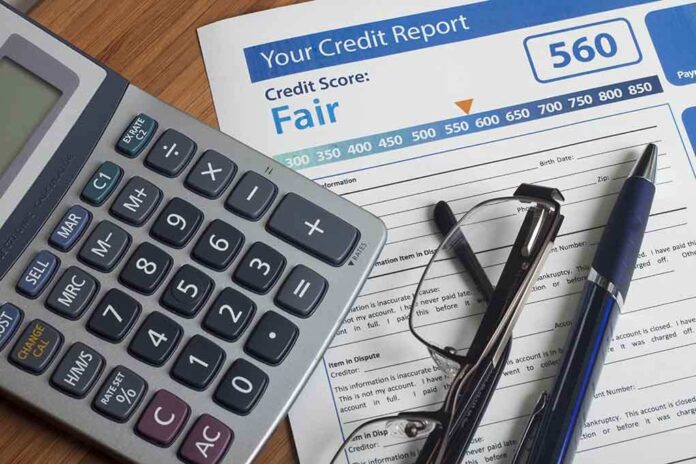
Closing a credit card could significantly impact your credit score, increase your credit utilization ratio, and potentially derail your financial plans if not approached strategically.
At a Glance
- Canceling a credit card can negatively affect your credit score by increasing your credit utilization ratio and shortening your credit history
- Keeping unused cards is beneficial when building credit, applying for a mortgage, or if there’s no annual fee
- Consider canceling if you have difficulty managing multiple accounts, face high fees, or struggle with responsible spending
- Before canceling, assess your overall financial goals, pay off the balance, and remove recurring charges
How Closing a Card Affects Your Credit Score
When you close a credit card, you’re potentially impacting two critical components of your credit score: your credit utilization ratio and the length of your credit history. Your credit utilization ratio represents the percentage of available credit you’re using. Closing a card reduces your total available credit, which could cause this ratio to rise significantly—especially if the card had a high credit limit. Financial experts recommend keeping your utilization below 30% to maintain a healthy credit score.
Additionally, if the card you’re considering closing is one of your oldest accounts, shutting it down could reduce the average age of your credit accounts. This matters because longer credit histories generally result in higher credit scores. The impact is particularly pronounced for those who are relatively new to credit or have few accounts.
“Closing a credit card might hurt your credit score because removing a portion of your available credit will cause your credit utilization, a key credit scoring factor, to rise.” NerdWallet
“The impact is likely to be greatest if you are relatively new to credit or have few credit accounts, which is called a \”thin file.\”” NerdWallet
When to Keep an Unused Card
Keeping an unused credit card can be advantageous in several situations. If you’re planning to apply for a mortgage or other significant loan in the near future, maintaining your current credit profile is crucial. Any reduction in your credit score could result in less favorable interest rates or even loan denial. Additionally, if the card doesn’t charge an annual fee, there’s little financial downside to keeping it open, provided you’re not tempted to accumulate debt.
Long-established credit cards significantly contribute to your credit history’s length. If the card you’re considering closing is one of your oldest accounts, keeping it active—even with minimal use—can benefit your overall credit profile. Some cards also offer unique benefits or features that may no longer be available to new applicants, making them valuable to retain despite infrequent use.
When Canceling Makes Sense
Despite the potential credit score impact, there are legitimate reasons to close a credit card. High annual fees that outweigh the card’s benefits create an unnecessary expense that can drain your finances over time. If you find yourself struggling to manage multiple accounts effectively or are prone to overspending when credit is readily available, consolidating your accounts may help you maintain better financial control. Some people also choose to close store-specific cards when they no longer shop at that retailer.
Relationship changes can also necessitate closing joint credit accounts. During a divorce or separation, separating financial ties reduces the risk of future disputes and liability issues. However, before canceling any card, it’s wise to explore alternatives such as downgrading to a no-annual-fee version or requesting a product change with your issuer to maintain the account’s history while eliminating unwanted fees.
“Having good credit helps ensure you can secure loans, mortgages and credit cards with lower rates and favorable terms.” Bankrate
Steps to Take Before Canceling
If you’ve decided that canceling is the right move, taking a methodical approach can minimize potential negative impacts. Begin by reviewing your credit report to understand how this particular card fits into your overall credit profile. Calculate how closing the account will affect your credit utilization ratio across all your cards. If the impact seems significant, consider paying down balances on other cards first to offset the effect.
Pay off the card’s balance completely before closing it, as outstanding balances can continue to accrue interest and potentially damage your credit if payments are missed. Remember to identify and transfer any recurring charges to another payment method. Once those steps are complete, contact the card issuer directly—preferably by phone—to request cancellation. Ask for written confirmation of the account closure and zero balance, and follow up if this documentation doesn’t arrive within 30 days.
Alternatives to Cancellation
Before making the final decision to close an account, consider several alternatives that might better serve your financial interests. If annual fees are your primary concern, contact the issuer to request a fee waiver or downgrade to a no-fee version of the card. Many issuers offer product change options that allow you to keep your account history while switching to a card that better matches your current needs and spending patterns.
To keep an unused card active without creating debt, set up a small recurring payment—such as a subscription service—and enable automatic payments to ensure you never miss a due date. This maintains the account in good standing with minimal effort on your part. For secured credit cards that require a deposit, graduating to an unsecured card might be possible after establishing a history of on-time payments, allowing you to retrieve your deposit while maintaining the credit line.
“Once you’ve shown you consistently pay on time, some issuers will allow you to “graduate” to an unsecured card with better terms.” NerdWallet
Remember that the optimal approach varies based on individual circumstances—there’s no universal answer to how many credit cards someone should maintain. The key is making decisions that align with your personal financial goals while protecting your credit health for the future.












